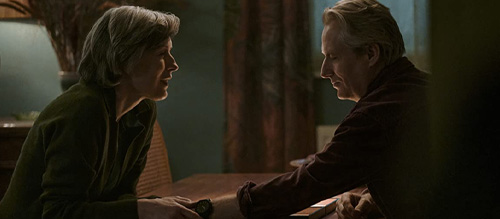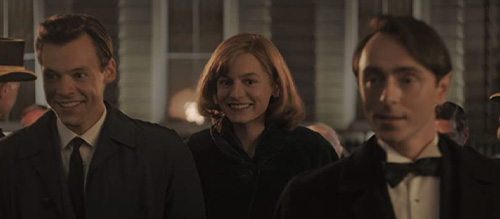My Policeman (2022) Review
My Policeman (2022)
Director: Michael Grandage
Screenwriter: Ron Nyswaner
Starring: Emma Corrin, Gina McKee, Harry Styles, Linus Roache, David Dawson, Rupert Everett
After Harry Styles’ abysmal performance in Don’t Worry Darling, fans were nervous about his return to the big screen in Michael Grandage’s LGBTQ+ period drama, My Policeman. The good news for Styles fans? He’s not terrible. The bad news? The film is so understated it hardly says anything at all.
Based on the eponymous 2012 novel by Bethan Roberts, My Policeman explores a complicated love triangle between a school teacher, a museum curator, and a policeman. Set against the quaint but highly conservative 1957 Brighton, UK, Tom (Harry Styles) meets Marion (Emma Corrin), a traditional woman who works at a school. The two quickly strike up a relationship which is confused by Tom’s close relationship with museum curator Patrick (David Dawson). Patrick becomes ensnared in the couple’s lives and the three of them must wrestle with sexuality, guilt, and jealousy.
Though My Policeman wants us to believe that Patrick and Tom’s relationship is worth their many sacrifices, we don’t see very much of it. There is a before the relationship and a tragic after, but almost nothing in between. Besides a sparse trip to Rome and a drunken encounter when the pair first meet, most of the film concerns itself with the tense friendships between the three central figures. Dawson and Styles deliver fairly believable performances, but it doesn’t make up for the stiff dialogue and lack of chemistry. Slow burns undoubtedly have their place in the romance genre, but My Policeman’s central romance dwindles instead of burns. With more concern for the repercussions of queerness in the 1950s, the film doesn’t make space for the actual relationship between its gay characters.
One of the most anticipated aspects of the film was its sex scenes. Earlier this year, Harry Styles told Rolling Stone that “so much of gay sex in films is just two guys going at it”. Forget the fact that Styles is an international pop star, this comment made sex a hyper-focus. People wondered if Styles had seen any queer cinema or could truly portray a tender, gay love seen. The scenes were understated and didn’t feel garish or exaggerated, but they certainly didn’t transcend “two guys going at it”. Compared to other queer cinema like Portrait of A Lady on Fire or even Call Me By Your Name, My Policeman didn’t feel particularly revolutionary. Not every queer movie has to break new ground for the LGBTQ+ community, but there is a certain expectation when one of the stars calls out every other film in the genre.

It is essential to dissect the political act of centering a policeman in this queer story. Though the film portrays acts of violence at the hands of the police, Tom is still a sympathetic and gentle character. There was an attempt to understand the layers of oppression within these three relationships but the film didn’t seem to know what it was working with. At every point it verges on political, the film takes a sharp narrative turn. It’s not directly harmful to the community, but the writing could’ve taken a more definitive stance on the social world it lives in.
More than a political or communal discussion, My Policeman is a quiet, meditative space about self-acceptance and repression. This is reflected in the narrative time shifts between the 1950s and an equally subdued 1990s. We See Tom, Patrick, and Marion (now portrayed by Linus Roache, Rupert Everett, and Gina McKee respectively) grapple with the consequences of their past in this later timeline. Patrick has suffered a stroke and Marion has faithfully (albeit, a bit reluctantly) taken him in. The older cast delivers a solid performance, but ultimately this storyline doesn’t come to fruition either. Marion (who takes center stage in this timeline) is not three-dimensional enough to function as a solid protagonist. Though we pity her at points, she doesn’t have a leg to stand on without her relationship with Tom.
That being said, Tom and Marion’s relationship is arguably the most fleshed out of the three in the earlier timeline. As a married couple, the pair love one another, even if it’s not in the traditional sense. It’s fascinating to watch the pair struggle to be good to one another whilst living their truths. Styles has the boyish charisma and innocence for Tom, but none of his quiet, bubbling anger. He doesn’t ruin the film by any means, but he struggles to deliver the high-intensity emotional climaxes necessary for the story. Important moments are often undercut by uneven performances and stilted dialogue.
My Policeman’s ambitious storytelling is admirable but fundamentally falls flat as a character study and political piece for the queer community. If nothing else, My Policeman is an opportunity to watch good actors work with a mediocre script – Harry Styles (originally the wildcard of the project) gave a good performance while the rest of the cast excelled. Despite the film being underwhelming, it’s exciting to see queer films enter the mainstream in such a big way. If anything, My Policeman points to a growing acceptance of LGBTQ+ relationships on screen. As the collection of LGBTQ+ films expands, community dialogue will continue to take place in the movie theater, and that is something to be grateful for.
Score: 12/24
Written by Emi Grant
You can support Emi Grant in the following places:
Instagram – @emi.grant
Portfolio – grantemi.portfolio.com
Twitter – @emii_grant


